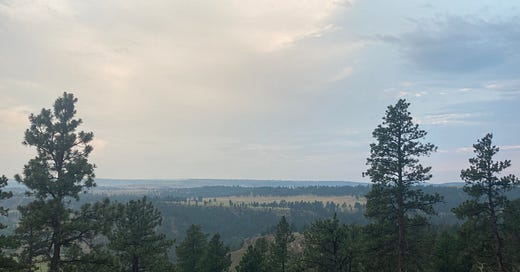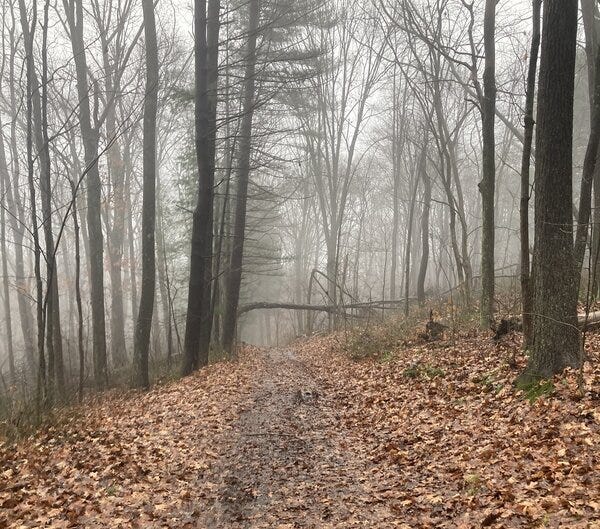A piece by guest author Charles Carroll.
I am by no means an environmentalist, whether in the liberal sense or in the extreme right sense. I have no plans to Gorilla Glue myself to priceless works of art nor any plans to cement myself to hot asphalt during rush hour all in the name of fighting Climate Change. Likewise, I do not anticipate myself going the Ted Kaczynski route anytime soon to return man to a more primitive state in tune with nature. As someone who is basically blind without glasses and also a fan of modern medicine, I would surely not fare well in Ted Kaczynski’s ideal world. Also, as someone who enjoys gasoline and air conditioning, I wouldn’t fare well either in the environmentalist Soviet Union that the left wishes to establish on Earth. I cringe at the thought of being called an “environmentalist,” given the connotations outlined above, not only due to the psychosis prevalent amongst those types, but also because of just how lame those people are. My rationale for loving this landscape and terrain is certainly non-traditional when compared to those two extremes.
During most of my journey as a conservative, I never paid much attention to appreciating or even conserving our lands. At times, I was often cavalier about sacrificing the land in the name of the Almighty GDP. I can’t quite put a finger on what brought about my change of heart. Partially it could be from my recently reflecting on our people’s grappling with this vast continent. There is certainly the influence as well from reading wonderful literature extolling the beauty of the American landscape. After reading some Hemingway, I must admit I have the sudden urge to go fishing. Possibly the largest influence is just from being stuck in a dull office space all day, but who knows?
It has become quite difficult to deny that life in suburbia lacks a certain vitality. Modern life has been in part defined by the prevalence of plastics and cements which insulate us from nature, and this is no more true than in the United States. I am willing to speculate freely that the majority of Americans throughout the course of their lives will be so hunkered down in their concrete bunkers that they will never experience the wonder and beauty of the American outdoors. It is a shame that many of us will never wander into virgin forest or gaze upon the stars that God set to rule the night (Psalms 135:9). The travesty is only aggravated when one considers how the vast majority of us will never gaze in wonder at the sight of a brook of clear water, let alone be enraptured by the melody of the passing water. The greatest source of shame is that not only are Americans insulated from the beauty of our land, but they have little to no appreciation of it, something that has blessed our nation so graciously.
For our ancestors, the land was the physical embodiment of hidden mysteries, endless potentials, promises of salvation, and countless dangers. It was centuries of conquest and warring, not only with other settlers and the many Indians but also with nature itself, for supremacy of the continent. It was in this centuries-long feud that America was born and raised. It was fed and raised off this land, and not only did it provide the daily sustenance for America to grow and sustain itself, but it also provided boundless inspiration for our culture to be nurtured in. No other author can articulate this relationship between America and her land as well as Mythoamerica:
“America is cursed. It’s haunted!” This is true, but it also is profoundly blessed — God’s country. The mysterious darkness of America draws in and rewards those willing to explore it (settlers, cowboys) with untold riches and abundance, never seen before in history.
Although they were neither the founders nor the ancestors of the United States, the Spanish reacted to discovering the Americas in a manner that serves well to illustrate the utter shock Europeans at the time felt at the discovery of the New World. It was here where no continent should have been that in fact there were two continents. It was here that a mighty empire of unique people was encountered that would clash with the Spaniards for supremacy of Central Mexico. Don’t forget as well that in this unknown and unexplored landmass there were great quantities of gold and natural resources ripe for the taking! To the Spanish, maybe the legend of the Seven Cities of Antilles was true after all. Maybe the Fountain of Youth did exist. Or even, maybe there would be another great empire to conquer and cart off their great riches — a new Mexico (hence, why New Mexico is named as such). To the Spanish then, and eventually to our English ancestors, America really was a mysterious darkness willing to bestow upon them endless treasures for the taking.
The real ancestors of the United States, the first English settlers, no doubt were just as enamored with and fascinated by this new land. They were also, in all likelihood, apprehensive about this unexplored terrain as well. As for the first settlers of Jamestown, it can be freely speculated that the disappearance of the Roanoke Colony was definitely on their minds or at least somewhere residing in their subconscious. Roanoke was a first attempt to tame the land by their countrymen only a small distance away, who were swallowed up by the land, as it seems. Maybe this land was truly haunted? This brings new meaning to how Washington Irving introduces the land known as Sleepy Hollow:
A drowsy, dreamy influence seems to hang over the land, and to pervade the very atmosphere… Certain it is, the place still continues under the sway of some witching power, that holds a spell over the minds of the good people, causing them to walk in a continual reverie.
The land would reward them, they hoped, but it seemed everywhere and hidden in every corner ready to strike them down.
Yet, the colonists who stayed and persevered would soon be rewarded with the great treasures of the land. To Jamestown, the cultivation of tobacco would bring vast wealth. To the Pilgrims of New England, the land would bestow a wide variety of crops and other staple foods all unique to the Americas, such as corn, pumpkin, and turkey. All across this land as well was an endless abundance of wood for fuel and building homes, something very scarce across the Atlantic in the British Isles. This land’s richness was so abundant that the generational wealth built up over four centuries from it is the reason we can read this rambling article on our phones today. It rewarded our ancestors then, and it rewards us still now.
To call ourselves true conservatives and patriots, it is essential both to love our land and conserve it. To understand the plight and struggles of our ancestors, and in turn to cherish the heritage they passed on to us, we must connect to the land. This land had much significance to our ancestors who toiled greatly in settling it. The land has claimed many of our ancestors, and our ancestors have, in turn, claimed the land. Those who gave life to us are buried in this land’s soil and will remain there until Judgment Day. Their spirits and influences can still be seen roaming the land. Our culture has been cultivated by this land while at the same time we cultivated the land. In sum, this land is truly haunted. It is a source of wonderment, mystery, and reward. Go outside, be inspired, conserve it, and pass it on to our progeny, just as those prior to us have graciously done.







Great pleasure reading this piece.
Thanks.
That was not the Charl(e)s Carroll my mind went to first.